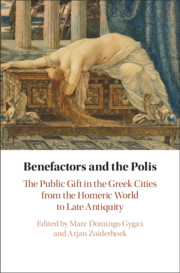 Benefactors and the Polis
Benefactors and the Polis from Part V - The Decline and Fall of Euergetism?
Published online by Cambridge University Press: 21 January 2021
Contrary to common belief, Christian bishops did not simply continue practicing traditional euergetism in Christianized form in cities of the late Roman Near East. From the late fourth century onwards, they had to answer for their use of church resources to an ideologically significant special interest group known as the ptōchoi. Entitled to church resources called the poor fund (ptōchika), this constituency was often comprised not only of the urban poor but of local monastic leaders who had close connections with influential lay donors. This chapter examines the details of three early fifth-century allegations of episcopal lithomania (excessive construction of church buildings) to date the historical emergence of this urban constituency and show how it pressured bishops to spend funds in their interest. It argues that the pressure exerted by this group was crucial in ensuring that episcopal budgets would be spent not just on monumental vanity projects but on philanthropic institutions and services. Hence these ptōchoi were actively involved in the politics that changed the urban landscape of the Roman Near East.
To save this book to your Kindle, first ensure [email protected] is added to your Approved Personal Document E-mail List under your Personal Document Settings on the Manage Your Content and Devices page of your Amazon account. Then enter the ‘name’ part of your Kindle email address below. Find out more about saving to your Kindle.
Note you can select to save to either the @free.kindle.com or @kindle.com variations. ‘@free.kindle.com’ emails are free but can only be saved to your device when it is connected to wi-fi. ‘@kindle.com’ emails can be delivered even when you are not connected to wi-fi, but note that service fees apply.
Find out more about the Kindle Personal Document Service.
To save content items to your account, please confirm that you agree to abide by our usage policies. If this is the first time you use this feature, you will be asked to authorise Cambridge Core to connect with your account. Find out more about saving content to Dropbox.
To save content items to your account, please confirm that you agree to abide by our usage policies. If this is the first time you use this feature, you will be asked to authorise Cambridge Core to connect with your account. Find out more about saving content to Google Drive.